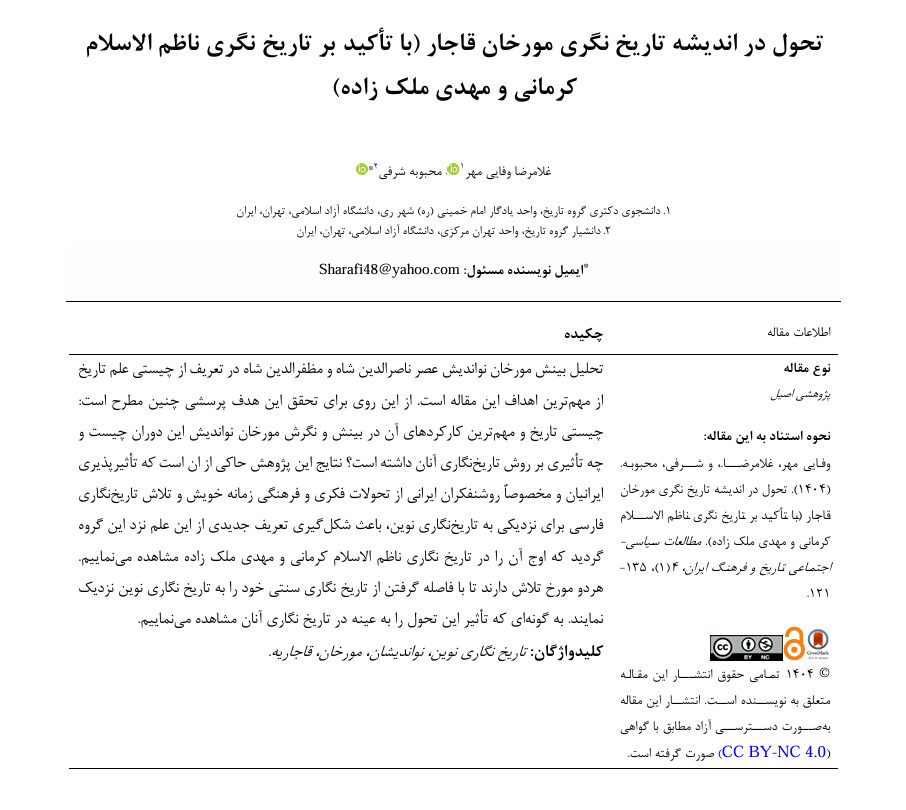Transformation in the Historical Thought of Qajar Historians (With Emphasis on the Historiography of Nazem al-Islam Kermani and Mehdi Malekzadeh)
Keywords:
modern historiography, reformists, historians, Qajar eraAbstract
Analyzing the intellectual perspective of reformist historians during the reigns of Naser al-Din Shah and Mozaffar al-Din Shah regarding the definition and nature of history as a discipline is one of the main objectives of this article. Accordingly, the central question posed is: What is the essence of history and its most significant functions in the worldview of reformist historians of this era, and how has it influenced their historiographical methodology? The findings of this study indicate that Iranian intellectuals—particularly the reformist elite—were significantly influenced by the intellectual and cultural transformations of their time. The efforts of Persian historiography to approximate modern historiographical methods led this group to formulate a new definition of history as a science. This development reaches its peak in the historiographical works of Nazem al-Islam Kermani and Mehdi Malekzadeh. Both historians endeavor to distance themselves from traditional historiography and align more closely with modern historiographical paradigms. The impact of this shift is clearly evident in their historical writings.
Downloads
References
Adamiyat, F. (1969). Amir Kabir and Iran. Tehran: Kharazmi Publishing.
Adamiyat, F. (1970). The thoughts of Mirza Fath Ali Khan Akhundzadeh. Tehran: Kharazmi Publishing.
Asad Abadi, J. (2000). The real causes of human happiness and misery In: Khosro Shahi (Ed.), Collection of letters and articles. Tehran: Kabeh Shargh Publishing.
Etemad al-Saltaneh, M. H. (1984). The organized history of Nasir al-Din Shah (Vol. 1). Tehran: Donyaye Ketab Publishing.
Ghadimi Qidari, A. (2011). Sayyid Jamal al-Din Asad Abadi and newer approaches to history. Islamic History Research Journal, 1(4), 55-70.
Ghadimi Qidari, A. (2014). Continuity and transformation of historiography in Iran during the Qajar era. Tehran: Research Institute of Islamic History Publishing.
Khavari Shirazi, M. A., & Afsharfar, N. (2001). The history of Dhul-Qarnayn. Tehran: Cultural and Islamic Guidance Publishing and the Library, Museum, and Documentation Center of the Islamic Consultative Assembly.
Malekzadeh, M. (2004). The history of the Constitutional Revolution of Iran. Tehran: Sokhan Publishing.
Maraghei, Z. A. (1969). The travelogue of Ibrahim Beg. Tehran: Agah Publishing.
Mohit Tabatabai, M. (1975). New research methods in Iran. Gohar Journal, 3(31), 100-133.
Mostowfi, A. (1992). My life story or the social history of Iran during the Qajar era (Vol. 1). Tehran: Zavar Publishing.
Nazem al-Islam Kermani, M. M. (2008). The history of the awakening of Iranians (Part One). Tehran: Amir Kabir Publishing.
Partovi Moghadam, A. (2009). A reflection on the historiography of the Qajar era and its factors until the Constitutional Revolution. Payk Noor Journal, 7(2), 3-15.
Rahimian, H. (2005). Contemporary Persian prose literature: From the Constitutional Revolution to the Islamic Revolution. Tehran: Samt Publishing.
Shamim, A. A. (1997). Iran during the Qajar dynasty. Tehran: Afkar Publishing.
Tabari, M. b. J. b. Y., & Qasemi, A. (1996). History of Tabari (Vol. 1). Tehran: Asatir Publishing.
Tafzili, A. (1991). Event recording: A tribute to Dr. Abbas Zaryab Khoyi. Tehran.
Tajbakhsh, A. (1997). History and historiography. Shiraz: Now Publishing.
Zarinkoub, A. (2000). The record of Islam. Tehran: Amir Kabir Publishing.








